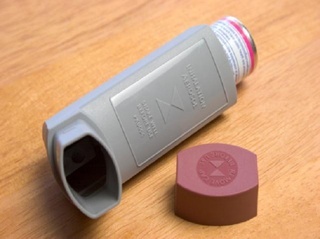
The US Food and Drug Administration (FDA) gave the marketing nod today to a novel once-daily inhaled therapy for the treatment of chronic obstructive pulmonary disease (COPD).
The product is a combination of the synthetic inhaled corticosteroid fluticasone furoate (FF) and the long-acting beta2-adrenergic agonist vilanterol trifenatate (VI) that some have hailed as the "son of Advair" (fluticasone propionate and salmeterol; GlaxoSmithKline). GlaxoSmithKline and its partner Theravance have announced that the new product will be called Breo Ellipta in the United States and Relvar Ellipta in Europe.
In contrast to Advair Diskus, which is dosed twice daily, the new once-daily inhaler contains a different, reputedly more stable side-chain variant of fluticasone, with vilanterol in place of salmeterol. The drugs are delivered via a dry powder inhaler containing 2 blister strips, each containing 30 doses of fluticasone or vilanterol. The manufacturer claims the inhaler design provides "consistent dosing even in patients with severe lung function impairment."
On April 17, the Pulmonary-Allergy Drugs Advisory Committee to the FDA voted 9 to 4 to recommend approval of FF/VI 100/25 μg as a once-daily inhaled treatment for reduction of COPD exacerbations, and 12 to 1 to support approval of the combination for the long-term maintenance treatment of airflow obstruction in COPD, the 2 indications GlaxoSmithKline sought for US approval.
Questions Still Exist
There is some question, however, about whether the improvements in airway obstruction seen in the manufacturer-conducted trials submitted for approval came from the corticosteroid or the long-acting beta2-adrenergic agonist component of the combination. According to FDA's summary minutes of the April 17 panel meeting, one member said that "there were no statistically robust data to support the contribution of FF component to the combination in either lung function trial."
An investigator for 2 double-blinded group trials, however, tells Medscape Medical News that compared with vilanterol alone, FF/VI was associated with a decreased rate of moderate and severe exacerbations of COPD in patients with a history of exacerbations.
In addition, the once-daily dosing may help to improve compliance, said Nicola A. Hanania, MD, associate professor of medicine in the Section of Pulmonary Medicine and director of the Asthma/COPD Clinical Research Center at Baylor College of Medicine in Houston, Texas.
"Fluticasone furoate has been shown to have a longer effect than fluticasone propionate, even though both are fluticasone, and that's why they were able to show that it's a once-a-day drug," he said. "Vilanetrol, as well, has once-a-day activity compared to salmeterol, which is a very weak agonist."
In these 2 studies, investigators saw an increased risk for pneumonia among patients receiving the combination, and there were 8 pneumonia deaths among the 3255 patients enrolled in the trials. All of the deaths occurred in patients receiving various fluticasone/vilanterol combinations; none occurred in patients receiving vilanterol alone.
At the FDA panel hearing in April, some panel members noted that the inhaler did not appear to be associated with cardiovascular, potassium, or tremor safety signals and that adverse event testing appeared adequate.
However, there were also concerns about the increased risk for pneumonia, fracture, and ocular adverse events such as elevated intraocular pressure. Some of the 5 members who voted "no" on the question of adequate evidence for safety said the risks from the therapy might outweigh the benefits in patients with mild COPD.
The FDA does warn that Breo Ellipta may cause serious adverse effects, including increased risks for pneumonia and bone fractures. The most common adverse effects seen among patients using Breo Ellipta included nasopharyngitis, upper respiratory tract infection, headache, and oral candidiasis.
The medication carries a boxed warning that long-acting beta2-adrenergic agonists increase the risk for asthma-related death. The safety and efficacy of Breo Ellipta in patients with asthma have not been established, and it is not approved for the treatment of asthma, according to the FDA.
There is also a patient medication guide with instructions for use and information about the potential risks of taking the drug. Breo Ellipta should not be used as a rescue therapy to treat sudden breathing problems (acute bronchospasm) and is not recommended for people younger than 18 years.
The cost of the therapy was not known at this time, but given that it is a new drug formulation in a novel inhaler design, there is likely to be a price premium compared with other therapies, Dr. Hanania said.
"We've had quite a bit of advancement in COPD pharmacotherapy in the last 10 years, which is really good because there is an unmet need. But one of the problems is they are costly, and people who can't afford it go back to their regular rescue medications," he said.
More information is available on the FDA Web site.
The studies submitted to the FDA were funded by GlaxoSmithKline. Baylor College of Medicine has received research support from the company.





 留言列表
留言列表
 線上藥物查詢
線上藥物查詢 